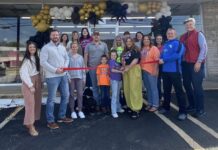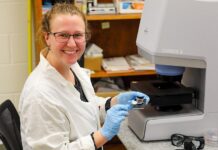In a calendar year chock full of great jobs gains for the state, the Upper Cumberland batted zero in terms of ECD gains. While the UC awaits for a potentially big jobs announcement, could this year’s election season kick up dirt in our favor?
UPPER CUMBERLAND – Last year was a banner year for Tennessee. Per its top “State of the Year” designation by Business Facilities magazine, more than 6,900 jobs were added and $3.2 billion invested over five top economic development projects.
But when it comes to sharing in those gains, even on the smaller scale, the Upper Cumberland is about as dry as Lubbock, Texas, in the scorching months of summer. As the 2014 campaign season kicks into high gear, candidates – both incumbents and newcomers alike – are being asked about one item and one item in particular: jobs. Where are they and when can the UC expect to get a shake at its fair share.
“I’ve been asking myself that question a whole lot lately, why not us?” said current Rep. Ryan Williams, who is running for re-election in District 43, which includes Putnam County. “It’s not for lack of effort. There’s growth everywhere else in the state, even in rural areas, except in this rural economic development district.”
Among the past year’s headlines: “Tire-maker Hankook to build $800M plant in Clarksville,” “ProNova Solutions announces $52 million investment, 500 jobs in Blount,” “Aramark may add 1,000 jobs in Nashville.” Even smaller rural counties, much like those in the UC, received press about expansions and renovations. Minus the addition of a pair of automotive suppliers in Warren County and the promise of a new company, Green Tech of Tennessee Inc., in Celina, not much else hit on the economic Richter scale here.
“We’ve been very frustrated as legislators,” said Rep. Cameron Sexton (R-Crossville), who is running for re- election in District 25, which includes Cumberland, Van Buren and Putnam counties. “Most of us came in at the same time over the last three and a half years, and feel like we’ve not been high enough on the radar. We still need the state’s help, that’s not what I’m saying, but we can’t be totally dependent on the Department of Economic and Community Development to be our pitch people. We have to start relying more on ourselves.”
And it’s not just incumbents who feel that strongly.
“I feel like we’ve been more of a fly over area when it comes to actually bringing businesses here to look,” said Paul Bailey, a White County commissioner who is running for Charlotte Burks’ soon-to-be vacated District 15 Senate seat, which covers Cumberland, Jackson, Overton, Putnam, White and Bledsoe counties. “Now sometimes companies may not want to locate here for certain reasons, there may not be the (infrastructure) but, gosh, we’re at a crossroads here, with Interstate 40, Highway 111, great east, west, north and south highways.
“We’ve got to bridge this gap.”
So what is it? It takes land and infrastructure, of course, which several UC counties have tried to bolster. The Highlands Business Park in Cookeville, for example, has garnered interest as it nears completion, but Cookeville Mayor and fellow District 15 Senate candidate Matt Swallows said they are already being told by site selectors to start looking for even more land to develop.
While it’s hard to put it into tangibles, the UC does have one notable negative: its distance to a major metropolitan airport. Not much can be done about that.
“From a site selector’s perspective, we’re about 16.4 miles too far,” Williams said. “And what we’ve found is that those 16.4 miles might as well be 1,000, because if they plug in this (data) into a formula, you’re not even on the list.”
Working together
So concerned are local legislators about the issue, that they’ve vowed to work more closely together this session. Literally. At least one meeting of the minds has already been held between those who represent the Upper Cumberland, and Sexton said he expects those efforts to continue, although it will admittedly require willingness and work.
The goal is to present a bigger, more unified voice when fighting for the UC. If everyone works together and is on the same page, a group of 12 is much harder to ignore.
“We’re taking a ‘what is good for one community is good for the whole community,’ approach,” Sexton said. “When we’re competing for new jobs or even for grants for existing companies, it’s hard for the rural areas to keep up. If someone’s looking to relocate to Davidson County, for example, they’ll have six or seven representatives and a few state senators when they go meet with ECD or the governor. If someone’s looking at Putnam County, you might have just a group of three. What we talked about is having the same shared voice, and really sit down and start working out some stuff.
“I can tell you, if we make an appointment with the department and all 12 of us go and they know 12 are coming, that sends a message all by itself. I think that’s a start.”
Meanwhile, at the local level, communities will be getting a little bit of a boost by the Tennessee Valley Authority (TVA) this coming April during a planned regional training event. Bess Rickman, TVA economic development consultant for the Southeast Valley Region, said the training will address the do’s and don’ts of the RFI (request for information) process that companies use to weed out prospect cities. While having a nice proposal and a completed, accurate RFI is the first step in attracting new jobs, conversely, the first reason to be cut, Rickman said, is to not turn in an RFI on time or to leave information incomplete.
“Each community has to know what their assets are and what their strengths are; what sets themselves apart and what assets they have that others don’t,” she said. “You’re telling your story and trying to put your best foot forward.”
While each community certainly has different assets to boost, Rickman said the region’s biggest are its plethora of post-secondary options, community colleges, colleges of applied technology, and Tennessee Tech as a lynchpin –even though it has a Cookeville address, the university can still be a card for the whole region to play.
“The three hottest prospects we’ve talked to since I’ve been in office has been because of Tennessee Tech,” Swallows said, adding that two of those prospects fell through because government funding issues. “Which just further tells me what an economic engine the university is for the entire region.”
Of course, at the end of the day it still takes available land and buildings to nab new prospects. While land will always be a hot commodity, the Upper Cumberland has its fair share of quick-turn buildings, or shelled spec buildings that are ready for a company’s customization, as well as certified data center sites. White County, for example, has an airport-adjacent industrial park and a spec building; and Overton County, also a recently completed spec building and a Select Tennessee certified site. The Highlands Business Park in Cookeville is moments away to nearing completion.
“We need to start spotlighting this area, and make sure people realize we have this infrastructure in place, that we should be a top priority,” Bailey added.
All that to say, maybe the UC is close?
“All this prep work and having all these pieces in place, eventually they’ll pay off,” Rickman said. “My goal and my hope is to see the Upper Cumberland prosper this year and to have a more successful year, or even an increase in activity. And having these pieces in place is just the first step to landing one of these projects.
“It’s hard to tell when that will be.”







